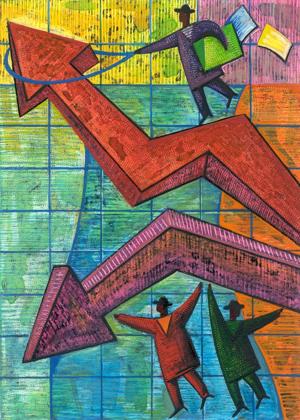Economics and its Effect on Business and on Human Resources and Marketing
In short: Economics is the study of how people choose to use resources.
Economics is the social science that studies the production, distribution, and consumption of goods and services. The term economics comes from the Ancient Greek οἰκονομία (oikonomia, “management of a household, administration”) from οἶκος (oikos, “house”) + νόμος (nomos, “custom” or “law”), hence “rules of the house(hold)”.[1] Current economic models developed out of the broader field of political economy in the late 19th century, owing to a desire to use an empirical approach more akin to the physical sciences
What is Money?
Economics aims to explain how economies work and how economic agents interact. Economic analysis is applied throughout society, in business, finance and government, but also in crime, education, the family, health, law, politics, religion, social institutions, war, and science. The expanding domain of economics in the social sciences has been described as economic imperialism
Economics is the study of how society manages its scarce recourses (Mankiw, 2004, p.4). Since all businesses are part of the economy, the way economy works has a major influence on all functional areas of business. This paper shows how changes in economic activity and inflation affect business as a whole and its Human Resources and Marketing functional areas in particular (“Level 2 Business,” n.d.).
Economic activity changes due to different reasons. Rate of growth at which economic activity changes is called economic growth (“Level 2 Business,” n.d.). At the time of slow economic growth or recession, people loose their jobs, unemployment level goes up, and income level decreases. As a result, demand for goods and services falls and sales slow down. Businesses have to consider accommodating to such changes in demand. To illustrate, in order to adjust to a falling demand, a company tries to cut prices to increase sales while suffering lower revenue and decreased profit margin .Thus, the firm might decide to cut back on production and/or reduce number of employees (“Level 2 Business,” n.d.). At the time of economic growth demand and sales increase, unemployment falls, and production goes up as businesses try to cope with the increased demand, Businesses try to accommodate these changes. For example, in order to keep up with the growing demand and increase in production level, firms might reconsider changes in the use of production equipment, changes in equipment or production facilities, amount of recourses needed (“Economics Basic,” n.d. Time and Supply section, para. 1). All of the above might bring production costs up. This, in turn, brings up prices for goods and services (“Level 2 Business,” n.d.). To control growing cost of production, businesses might decide to cut waste, to change the way people work, to use new technology, or to reconsider number of staff they employ.
**************************************************************
Money, Banking and the Federal Reserve
(45minutes video documentary ..we might not agree with some of the opinions but it worth to watch…This is economics and history as they are meant to be: fascinating, informative, and motivating.
Thomas Jefferson and Andrew Jackson understood “The Monster”. But to most Americans today, Federal Reserve is just a name on the dollar bill. They have no idea of what the central bank does to the economy, or to their own economic lives; of how and why it was founded and operates; or of the sound money and banking that could end the statism, inflation, and business cycles that the Fed generates.
Dedicated to Murray N. Rothbard, steeped in American history and Austrian economics, and featuring Ron Paul, Joseph Salerno, Hans Hoppe, and Lew Rockwell, this extraordinary film is the clearest, most compelling explanation ever offered of the Fed, and why curbing it must be our first priority.
How an Economy Grows and Why It Doesn’t (by Irwin Schiff)
**************************************************************
Inflation is a rise in a general price level over a period of time (Mankiw, 2004, p.12). For example, prices for goods and services, prices for raw materials, and prices for individual as well as firms insurance go up. It becomes difficult for businesses to plan ahead since inflation affects not only the amount received from for sales but also the prices of input. Businesses might start paying higher salaries to their employee to keep up with inflation. In addition, prices of raw material go up.
As prices of input increase, a cost of production goes up causing an increase in prices. If wages do not rise by the same level as inflation, spending power is affected, savings level can also fall. This leads to a decrease in income and decrease in demand and sales follow. Again, firms take action in order to accommodate these changes (“Level 2 Business,” n.d.).
Motivators More Powerful than Money?
Human Resources (HR) and Marketing areas of business are affected by changes in economic activity and inflation. Because Human Resources functional area is responsible for recruitment, retention, training, conditions of work, health and safety, and worker representation, it has to consider rising or falling unemployment that results from changes in economic activity or inflation. When unemployment rate is rising, the HR department must deal with issues associated withlayingoff firm’s employees, for example. The department can take necessary actions to make this process less painful and less problematic as possible for both the company and its employees. For example, it assists employees to understand and adjust to a new situation. In addition, Human Resources may provide job training to the remaining employees in order to meet changes in their new or expanded job duties.
During increase in economic growth or inflation, when the level of unemployment is low and firms are in need of more workers, it becomes difficult to recruit necessary employees. The department has to make additional efforts in recruitment in order to get labor. Human Resources is also responsible for retention of company’s labor. The department usually plans for and takes actions that will help a firm to retain its workers. For example, they can provide develop and foster programs aimed at increasing employee satisfaction. The department often considers a possible pay raise to hire new or retain its existing labor force.
Because Marketing department is responsible for market research, market analysis, market strategy, and sales, it pays particular attention to the economic situation to see how current or future demand, prices and sales are going to be affected. This helps to determine actions a firm should take or plan on taking in order to succeed or, at least, to stay in business. For example, observing slow economic growth or inflation when demand and sales are falling, the department will try to cut production and selling costs (“Level 2 Business,” n.d).
Moreover, it may reconsider and adjust projected sales and prices as well as company’s marketing strategy. In the time of economic growth when demand and sales increase, unemployment falls, and production goes up, Marketing must consider how to accommodate these changes and adjust production and sales strategy as well as prices accordingly.
In addition, knowledge of current or anticipated economic situation is essential when planning for a new product. Based on the discovery and recommendations of the Marketing department, other departments can properly plan or adjust their work.
To summarize, all functional areas of business including Marketing and Human Resources are affected by changes in economic activity, changes in inflation rate, and other possible changes in economics. These departments as well as entire company should recognize the impact of current and possible future economic situation on business, and take actions in order to accommodate these changes.
References
Economics Basics: Demand and Supply. Investopedia: A Forbes Media Company
Retrieved September 3, 2007 from http://www.imvestopedia.com/university/economics/economics3.asp
Level 2 Business and economics: The Economic context of business. Level 2
Business and Economics Education. Retrieved September 3, 2007 from
http://www.bized.co.uk/educators/level2/external/lesson/context1.htm
Mankiw, G. (2004). Principles of Economics.Mason, OH: Thomson South-Western
———————————————————————————————————-
For information about social media networking and SEO tips, tricks, social media good practice, online tools and how to market your site visit New York Web Designer Agency Website
Related articles
- Could slowdown in Scottish economic recovery affect business insurance policyholders? (premierlinedirect.co.uk)


